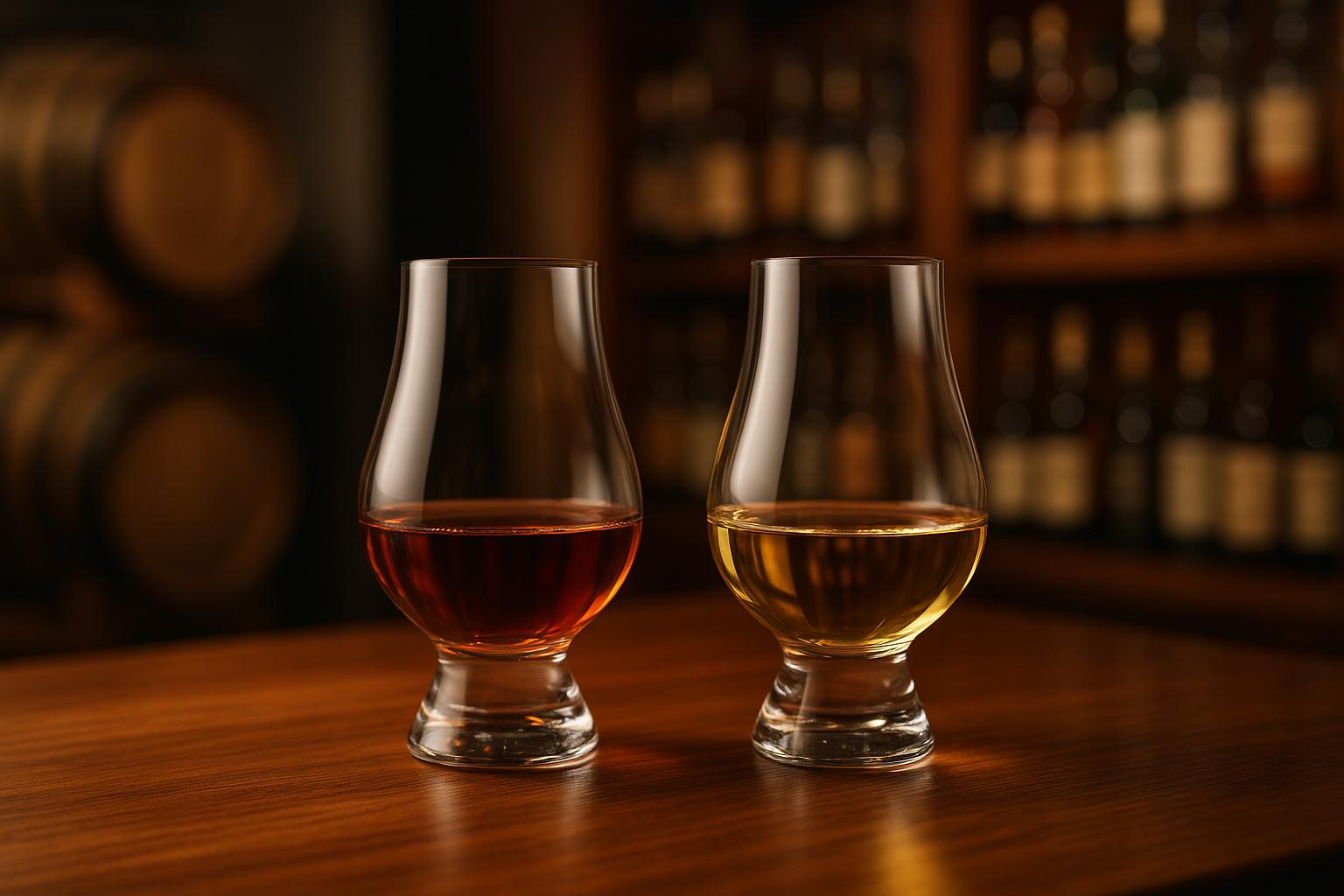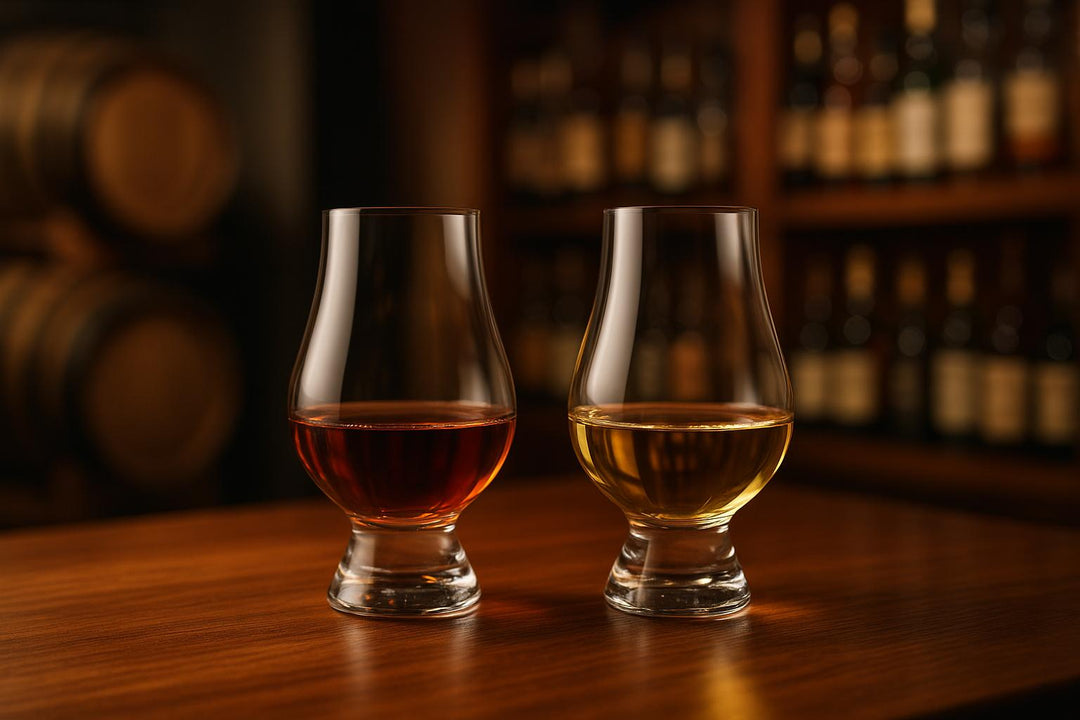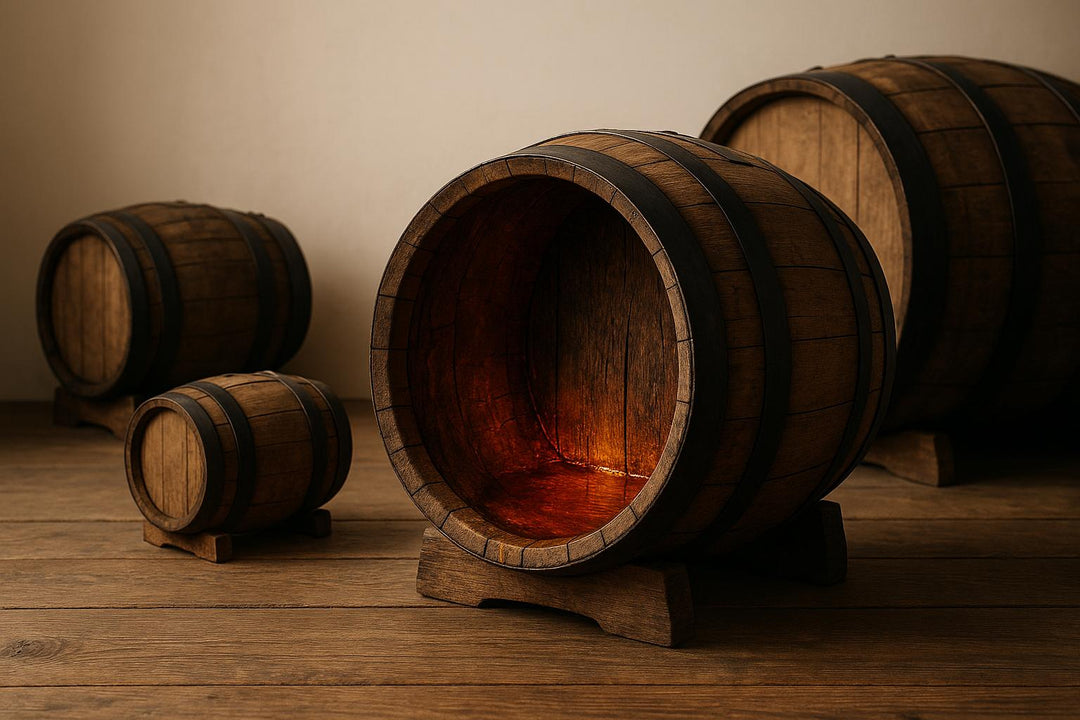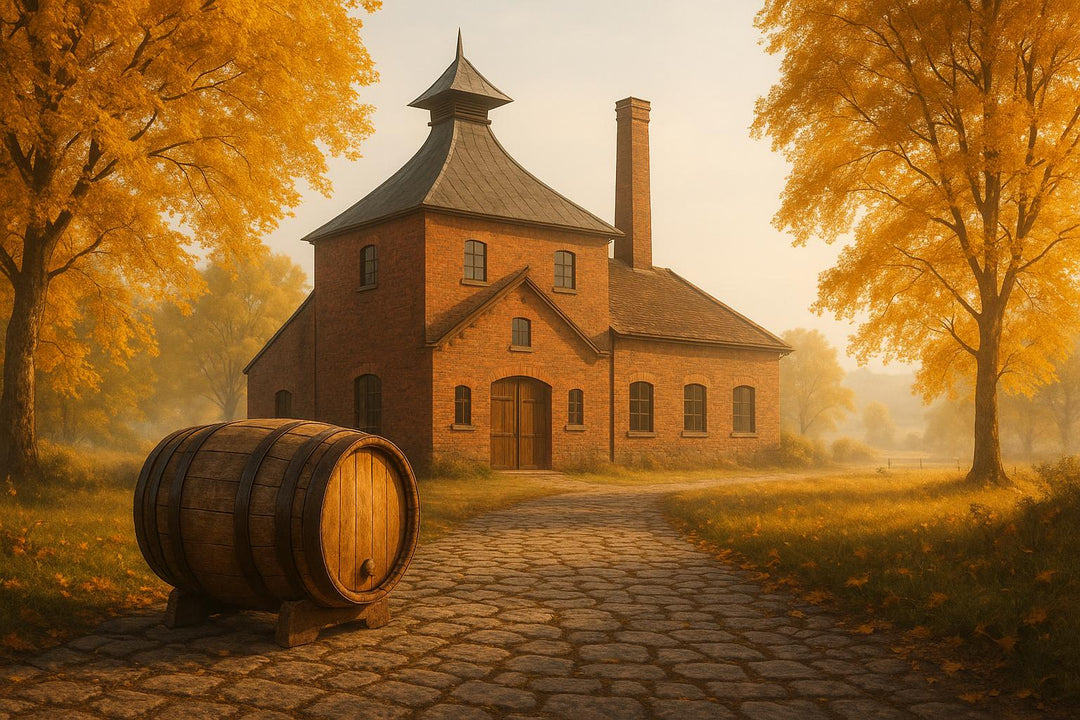When it comes to premium whisky, small batch and single cask are two terms that stand out. Here's a quick breakdown of what they mean:
- Small Batch: Whisky made by blending a limited number of barrels (usually 5–50) to create a consistent and balanced flavour. It’s reliable and offers subtle variations across batches.
- Single Cask: Whisky bottled from a single barrel, offering a one-of-a-kind flavour profile. Each bottle reflects the unique character of that specific cask, making it rare and highly collectible.
Key Differences:
- Consistency: Small batch offers uniformity; single cask is more variable.
- Availability: Small batch is more accessible; single cask is limited to 300–600 bottles per cask.
- Flavour: Small batch is blended for balance; single cask highlights bold, distinct traits.
- Collectability: Single cask whiskies are rarer and often more sought after by collectors.
Whether you prefer the dependable quality of small batch whiskies or the exclusivity of single cask releases, both offer unique experiences for whisky enthusiasts. Your choice depends on whether you value consistency or the thrill of something irreplaceable.
Help! Small Batch, Single Barrel, Cask Strength. What Does It All Mean?
Production Methods and Scale
Small batch and single cask whiskies stand apart not just in how they’re made, but also in their scale and underlying philosophy. To truly appreciate the unique experience each offers, it’s helpful to look at their production methods in detail.
How Small Batch Whisky Is Made
Small batch whisky production follows the same basic steps as mass production but with much tighter control at every stage. It all starts with selecting high-quality ingredients. Distillers pay close attention to the mash bill, fermentation process, and ageing, ensuring every element is carefully monitored [2].
"Small batch whiskey production is an art form that requires careful planning, quality ingredients, and precision in every step of the process." - Distillery University [1]
What sets small batch apart is the limited number of barrels used. Typically, a batch involves anywhere from 10 to 50 barrels, though some distilleries, like Chicken Cock Whisky, cap their small batches at no more than 15 barrels [3][5]. During blending, each barrel contributes its own unique characteristics - some might bring sweet vanilla notes, while others add hints of smoke or oak.
"With fewer barrels in each batch, distillers can blend more deliberately. Some barrels offer sweet vanilla, others lean toward smoke or oak. Together, they build a layered, expressive whisky that's far more interesting than a mass-market blend." - Hush and Whisper Distillery [2]
Small batch production often relies on pot stills rather than the column stills used in large-scale operations. This equipment allows for even more precision and control over the final flavour profile [2]. But when it comes to single cask whisky, the process takes a completely different turn.
The Single Cask Process
Single cask production is all about exclusivity. Instead of blending multiple barrels, each bottle comes from a single, carefully chosen cask [4]. The process starts with a meticulous evaluation of individual barrels. Only those that show exceptional flavour development and unique character are selected. Once a cask is chosen, its entire contents are bottled, usually resulting in just 300 to 600 bottles [6].
"Some whisky collectors see single barrel expressions as the epitome of the single malt category because the flavours from that particular barrel cannot be replicated in any other batch." - Cotswolds Distillery [6]
Unlike small batch whisky, single cask releases aren’t blended for consistency. This means each release offers a one-of-a-kind tasting experience, shaped entirely by the characteristics of that individual cask. Naturally, this production method has a direct impact on availability.
Impact of Scale on Availability
The scale of production plays a significant role in how readily available these whiskies are. Small batch releases are produced multiple times a year, offering subtle variations while maintaining a consistent house style. In contrast, single cask releases are far more limited, with only 300 to 600 bottles per cask [6]. For whisky enthusiasts, small batch expressions provide a chance to explore evolving nuances over time, while single cask releases deliver a truly unique, one-off experience that can’t be replicated.
Flavour Profile and Consistency
When it comes to whisky, small batch and single cask expressions cater to different palates. Small batch whiskies focus on delivering steady, reliable flavours through blending, while single cask whiskies embrace the unpredictability and individuality of a single barrel.
Consistency in Small Batch Whiskies
Small batch whiskies are all about precision. By blending whisky from multiple barrels, distillers create a product that’s consistent in flavour and quality.
"Small batch bourbon is produced by blending a limited number of carefully chosen barrels to create a consistently high-quality whiskey with a unique character." [8]
This method smooths out any inconsistencies found in individual barrels, ensuring each bottle reflects the distillery’s signature style. For example, Heaven Hill’s Elijah Craig and Evan Williams small batch bourbons are blended from around 200 barrels, which helps maintain a uniform flavour profile across each release [7].
This reliability makes small batch whiskies a favourite for those who want to know exactly what they’re getting with every pour. It’s the whisky equivalent of a dependable friend - always familiar, always satisfying. On the other hand, single cask whiskies take a completely different approach.
Variation in Single Cask Whiskies
Single cask whiskies are a celebration of individuality. Each bottle comes from just one barrel, making every release a unique snapshot of the whisky-making process.
"Each barrel imparts its own character to the bourbon, influenced by factors like the barrel's location in the warehouse, the wood's characteristics, and the aging duration. This results in each single-barrel release being a distinct expression, with slight variations that cater to those seeking a one-of-a-kind bourbon experience." [9]
No two single cask whiskies are ever quite the same. One barrel might burst with rich vanilla and caramel, while another leans into spicier, leather-like tones. This unpredictability is part of the charm, offering drinkers a chance to explore whisky in its rawest, most unfiltered form. However, this approach can occasionally lead to "off-profile" flavours - quirks that some enthusiasts find thrilling, while others may find challenging.
Comparison Table: Flavour and Consistency
| Aspect | Small Batch | Single Cask |
|---|---|---|
| Consistency | High – uniform across batches | Low – every cask is different |
| Batch Size | 10–200 barrels blended | Single barrel only |
| Flavour Profile | Balanced and harmonious | Bold and distinctive |
| Variation Between Bottles | Minimal variation | Significant variation possible |
| Off-Profile Risks | Eliminated through blending | May appear in the final product |
| Predictability | High – reliable house style | Low – one-off expressions |
| Appeal | For those who value consistency | For those who enjoy unique experiences |
Whether you prefer the steady, polished flavour of small batch whiskies or the adventurous, one-of-a-kind nature of single cask releases, each offers something special. Small batch expressions provide a comforting sense of familiarity, while single cask whiskies invite you to explore the unexpected. It all comes down to what you’re craving in your glass.
sbb-itb-128d6c1
Rarity, Collectability, and Long-Term Value
As we delve deeper into whisky production, it becomes clear that rarity plays a crucial role in determining collectability and long-term value. The scale of production has a direct impact on scarcity, setting single cask releases apart from small batch expressions. For collectors and investors, understanding these differences is key to making informed decisions.
Rarity of Small Batch vs. Single Cask
When it comes to rarity, single cask releases stand in a league of their own. Why? It all boils down to numbers. A single cask typically produces between 100 and 300 bottles, depending on the cask size [10]. In contrast, small batch expressions can yield anywhere from 1,500 to 25,000 bottles, while mass-market whiskies - blended from up to 2,000 barrels - can result in as many as 500,000 bottles [11]. This stark difference in scale makes single cask whiskies far more exclusive.
What makes single cask bottlings even more desirable is their individuality. Each cask has its own distinct character, colour, and flavour profile, often bottled at cask strength and without chill-filtering [10]. This combination of uniqueness and limited availability makes them highly sought after by collectors.
Factors Influencing Collectability
Several factors contribute to a whisky's collectability, starting with the reputation of the distillery and the provenance of the cask. Details such as where the cask was stored, how long it was aged, and the conditions of maturation all add to its allure.
The scarcity of older casks from renowned distilleries has further driven up their value. Some single cask whiskies now fetch six-figure sums at major auctions [12]. Critical acclaim can also transform a release into a collector's dream. A prime example is the Yamazaki Sherry Cask 2013. When Jim Murray named it the Best Whisky in the World in 2014, its value skyrocketed from under £150 to over £14,000 [15]. These elements not only influence collectability but also hint at the potential for long-term appreciation.
Long-Term Value and Investment Potential
The appeal of limited releases extends beyond collectability - they're also seen as promising investments. Scarcity and market perception are the driving forces behind their value. As Jay Bradley, Founder of The Craft Irish Whiskey Co., explains:
"Whisky is a difficult and expensive thing to make, so distilleries recoup their costs by producing lots of it... While the whisky might be good, it's never going to rise in value significantly because there's so much of it on the market." [15]
Mass-produced whiskies, while enjoyable, rarely gain significant value due to their abundance. On the other hand, limited releases, particularly single cask bottlings, often appreciate significantly on the secondary market [14]. However, collectors should temper expectations and approach the market with due diligence.
Demand for rare whiskies has surged, especially in Asia and emerging markets, pushing prices higher [14]. That said, trends in whisky collecting can shift quickly. The distillery that’s popular today might not hold the same appeal in the future [13]. Key factors influencing auction prices include rarity, the condition of the bottle (such as fill level), provenance, distillery reputation, vintage quality, and critical acclaim [14]. For those venturing into whisky investment, ensuring authenticity is crucial [14].
Finally, sourcing collectible bottles requires care. Working with trusted specialists like The Really Good Whisky Company, known for their rigorous provenance checks, can provide added confidence when adding rare expressions to your collection.
Selecting and Sourcing Premium Small Batch and Single Cask Whiskies
The whisky market has experienced a staggering growth of over 350% in the past decade [17], making it increasingly challenging to find genuine premium bottles. With authenticity and provenance under greater scrutiny than ever, understanding what to look for can mean the difference between a rewarding discovery and an expensive disappointment. Whether you're after a rare single cask release or an exquisite small batch whisky, being informed is key.
What to Look for When Buying
When evaluating premium whisky, start with the basics: bottle numbering. Legitimate limited editions will often include something like "Bottle X of Y", which confirms their rarity. For single cask releases, checking the cask number is vital - it pinpoints the exact barrel your whisky came from and serves as a hallmark of authenticity.
Labels are another treasure trove of information. They should include details like alcohol content, distillation date, ageing process, and any unique characteristics. Handwritten batch numbers, barrel specifics, and master distiller signatures are all signs of genuine care and craftsmanship. The Scotch Whisky Regulations 2009 require clear labelling, specifying the whisky category, distillery name, and maturation details [19].
Cask strength whiskies deserve special attention. These bottlings provide unfiltered details about the cask type - whether American Oak or European Oak - offering insights into the whisky's flavour profile. Independent bottlers must also clearly identify themselves, as their reputation often speaks volumes about the quality. When inspecting a bottle, check for inconsistencies in the packaging and ensure the alcohol by volume (ABV) matches the label. Logos from recognised industry groups can further confirm authenticity. These steps lay the groundwork for a well-informed purchase, but expert curation takes it to the next level.
The Role of Expert Curation
With rare single malts seeing an 11% year-on-year increase in Q1 2025 [17], expert curation has become increasingly important. Specialists use advanced techniques like gas chromatography-mass spectrometry to identify unique flavour compounds and carbon dating to verify ageing claims [18]. They also ensure that labels accurately reflect details like "single malt" designations or age statements, guarding against overstatements.
A great example of this meticulous approach is The Really Good Whisky Company. Their team, with expertise spanning Scotch, Japanese, American, and world whiskies, rigorously evaluates each bottle. They employ direct partnerships with distilleries to oversee the bottling process, ensuring that every detail - from cask to bottle - is accounted for. For collectors, working with specialists not only simplifies the process but also provides access to authenticated bottles that are often unavailable through auctions or retail stores. Beyond human expertise, technology plays a growing role in securing provenance.
Ensuring Provenance and Authenticity
Modern tools like blockchain, NFTs, digital certificates, DNA fingerprinting, spectrometry, and chromatography have revolutionised whisky authentication [16][18]. These technologies help secure provenance and provide peace of mind for collectors.
Equally important is the storage history of a bottle. Documented production and storage records can significantly enhance both authenticity and long-term value. For older releases, proper storage conditions play a critical role in maintaining quality and verifying legitimacy.
The Really Good Whisky Company addresses these concerns comprehensively. Their process includes examining distillery records, storage documentation, and chain-of-custody details. With worldwide shipping that comes with proper documentation and insurance, as well as a London boutique where collectors can personally inspect bottles, they provide a seamless experience. This attention to detail ensures that collectors can invest with confidence, knowing their bottles are genuine and backed by verifiable authenticity.
Key Takeaways
Summary of Differences
The main distinctions between small batch and single cask whisky come down to production methods, flavour consistency, and rarity. Small batch whisky is crafted by blending a selection of barrels to create a consistent and balanced flavour profile. This makes it a reliable choice for sipping neat or mixing into cocktails.
On the other hand, single cask whisky is drawn from just one barrel, offering a unique taste that reflects the character of that specific cask. Each release is exclusive and unrepeatable, making every bottle a one-of-a-kind experience.
| Aspect | Small Batch | Single Cask |
|---|---|---|
| Production | Blended from multiple barrels | Bottled from a single barrel |
| Flavour Profile | Consistent and balanced | Unique and variable |
| Rarity | More widely available | Extremely limited per cask |
| Investment Potential | Moderate growth potential | Greater potential for appreciation |
From an investment angle, single cask whiskies often hold more long-term value. According to the Knight Frank Luxury Investment Index, the value of investment-grade Scotch whisky has risen by over 560% in the past decade [20]. The exclusivity and scarcity of single cask editions significantly enhance their appeal to collectors.
These differences highlight why each type attracts different whisky enthusiasts and collectors.
Final Thoughts for Whisky Enthusiasts
Both small batch and single cask whiskies have their own unique charm. Choosing between them depends on your personal preferences and goals as a collector. Small batch whiskies provide dependable quality and are perfect for everyday enjoyment, while single cask releases offer a rare and distinctive experience, ideal for special occasions or as thoughtful gifts.
If you're ready to explore these categories, The Really Good Whisky Company offers expertly curated selections of premium small batch whiskies and rare single cask releases. Their dedication to authenticity, backed by direct distillery partnerships, ensures access to genuine, high-quality whiskies from Scotland, Japan, America, and more. Whether you're building a collection or simply searching for your next exceptional dram, their carefully chosen range makes finding the perfect bottle a seamless experience.
FAQs
What should I consider when deciding between small-batch and single-cask whiskies for investment?
When it comes to whisky investment, there are a few key elements to keep in mind: rarity, exclusivity, and potential for value growth. Single-cask whiskies stand out because they’re drawn from a single cask, making them incredibly limited. This rarity often makes them highly desirable among collectors, which can lead to quicker increases in their value.
Small-batch whiskies, on the other hand, are produced in slightly larger quantities. They offer a more consistent flavour profile and typically come with a lower starting price. While they may not gain value as rapidly as single-cask whiskies, certain well-regarded small-batch releases can still be a solid investment over time. Considering these factors carefully will help you decide which option best suits your collection or investment goals.
What’s the difference between small batch and single cask whiskies in terms of flavour and collectability?
Small batch whiskies are made by blending a limited number of barrels, creating a flavour profile that's both balanced and consistent. At the same time, these whiskies manage to retain a distinctive character that appeals to whisky lovers. On the other hand, single cask whiskies come from a single barrel, offering a snapshot of the unique and often more intricate flavours tied to that specific cask.
When it comes to collecting, single cask whiskies are incredibly desirable. Their rarity and individuality make each bottle a true one-off, a treasure for enthusiasts. Meanwhile, small batch whiskies, though not as rare, are appreciated for their meticulous craftsmanship and dependable quality. This makes them a solid choice for collectors and casual whisky drinkers alike.
How can whisky enthusiasts confirm the authenticity and origin of premium small-batch and single-cask whiskies?
To confirm the genuineness and origin of premium small-batch or single-cask whiskies, start by closely examining the label. Pay attention to details like proper spelling, batch numbers, cask numbers, and distillation dates. Additionally, check the bottle for any signs of tampering, such as broken seals or unusual marks. Buying from well-known and reliable retailers is another crucial step to reduce the risk of ending up with a counterfeit.
For those dealing with rare or high-value bottles, some collectors and whisky enthusiasts might turn to scientific methods to verify the whisky's age and origin. While not common, these techniques can provide an extra layer of assurance. By taking these precautions, you can savour your whisky, confident in its quality and authenticity.







Leave a comment